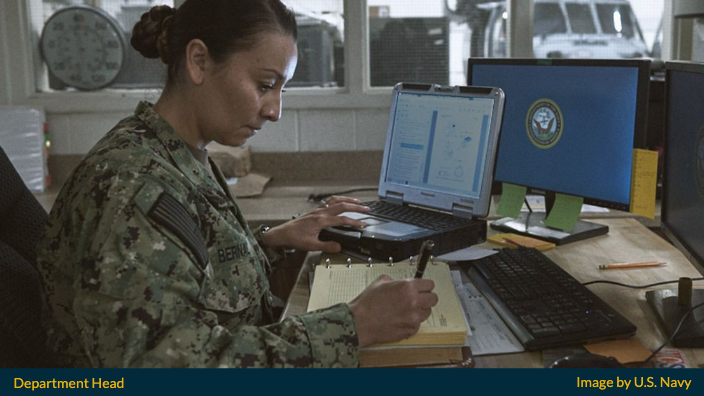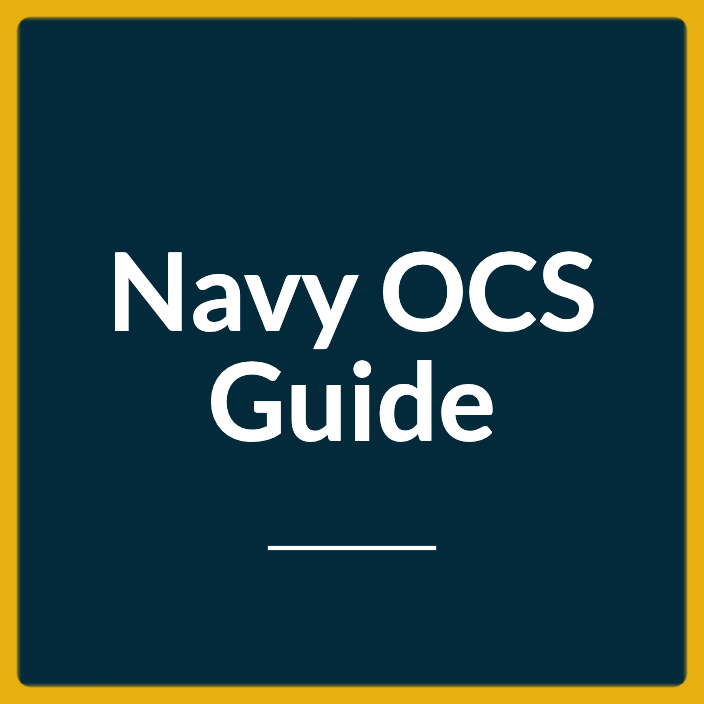If you’re keen on understanding the ins and outs of Navy officer jobs, you’ve probably come across the term “Navy Department Head.”
This key role might sound like another one of those Navy jargons, but it’s actually a critical position that comes with significant responsibilities.
This article will dive into the nuances, roles, and qualifications of a Department Head in the U.S. Navy.
The Role Defined: What Does a Department Head Do?

A Department Head in the U.S. Navy is mid-level management—usually a Lieutenant Commander or Commander. They run a department on a ship, squadron, or shore installation.
Think of it like a middle manager in a civilian company. If the Navy were a business, they’d be the ones overseeing multiple divisions, keeping everything on track.
Key Responsibilities
- Leadership and Management: A Department Head handles the leadership and administration of their department. This involves ensuring everyone under their purview is trained, prepared, and executing their duties effectively.
- Planning and Operations: Whether at sea or ashore, Department Heads are integral to planning and executing missions, training exercises, and other operations.
- Financial Oversight: They handle budget management, ensuring that funds are allocated and spent wisely within their department.
- Compliance and Governance: Adherence to Navy regulations, policies, and standards is a significant part of the job. This includes maintaining proper records, ensuring safety protocols are followed, and regular reporting to higher-ups.
How to Become a Department Head?
Getting to the Department Head position isn’t a walk in the park; it’s a product of years of hard work, dedication, and qualifications.
Qualifications Needed
- Education: A bachelor’s degree is a prerequisite. Most officers also hold postgraduate qualifications, often in fields relevant to their department.
- Years of Service: Usually, a minimum of eight to twelve years of commissioned service is required.
- Rank: Typically, a Lieutenant Commander or Commander will serve as a Department Head.
- Training: Completing leadership and specialty-specific training is often required, especially for specialized departments like Engineering or Intelligence.
Selection Process
Becoming a Department Head involves a competitive selection process. Eligible officers are evaluated on their performance, qualifications, and leadership skills.
The final decision often includes endorsements from existing senior officers and a review board.
Example: Department Heads on a Destroyer
For those who wonder what this might look like in the real world, let’s take a typical Arleigh Burke-class Destroyer as an example. Here are the departments and their respective heads:
- Combat Systems Department: Responsible for operating and maintaining the ship’s weapons, sensors, and communication equipment.
- Engineering Department: Takes charge of the ship’s mechanical systems, including propulsion, electrical systems, and other engineering machinery.
- Operations Department: Manages the planning and execution of ship’s missions, from navigational plans to intelligence.
- Supply Department: Ensures the ship and crew are fully stocked with necessary supplies, from food to ammunition.
- Medical Department: Takes care of the healthcare needs of all aboard.
Each Department Head in this setting has specialized training and expertise in their field to ensure smooth sailing, literally.
Day-to-Day Life as a Department Head
If you’re aspiring to become one, you might wonder what an average day looks like for a Department Head. Here’s a snapshot:
- Morning Briefings: The day usually begins with briefings from division officers or chiefs, summarizing the department’s current status and tasks for the day.
- Inspections and Oversight: Regular checks on various activities, personnel, and equipment usually fill the morning hours.
- Administrative Work: Afternoons often involve paperwork, including financial reporting, compliance checks, and personnel management.
- Training and Development: There’s often a focus on personnel training, either through direct involvement or planning and evaluation.
Career Progression: What Comes After?
Becoming a Department Head is often a stepping stone to higher ranks and positions in the Navy.
Following a successful stint, officers may be promoted to roles such as Executive Officer of a ship, squadron, or installation.
To Sum It Up
TA Navy Department Head runs a department and keeps operations smooth. It’s a high-responsibility role that demands experience, leadership, and the ability to handle both admin work and complex missions.
This isn’t just another officer job—it’s a serious leadership commitment. The challenges are real, but so is the career growth. If you’re looking for a role that pushes you and puts you in charge, this is it.

